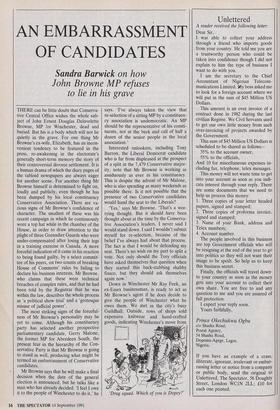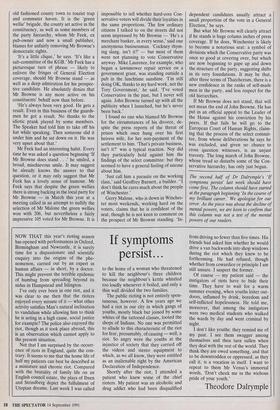AN EMBARRASSMENT OF CANDIDATES
Sandra Barwick on how
John Browne MP refuses to lie in his grave
THERE can be little doubt that Conserva- tive Central Office wishes the whole sub- ject of John Ernest Douglas Delavelette Browne, MP for Winchester, dead and buried. But his is a body which will not lie quietly in the grave. For one thing Mr Browne's ex-wife, Elizabeth, has an incon- venient tendency to be featured in the press, re-awakening in the electorate's generally short-term memory the story of their controversial divorce settlement. It is a human drama of which the diary pages of the tabloid newspapers are always eager for another scene. For another thing Mr Browne himself is determined to fight on, loudly and publicly, even though he has been dumped by his local constituency Conservative Association. There are va- rious signs of Mr Browne's confidence of character. The smallest of these was his recent campaign in which he continuously wore a top hat while in the chamber of the House, in order to draw attention to the plight of three Grenadier Guards who were under-compensated after losing their legs in a training exercise in Canada. A more forceful indication of it came in his reaction to being found guilty, by a select commit- tee of his peers, on two counts of breaking House of Commons' rules by failing to declare his business interests. Mr Browne, who claims that these were technical breaches of complex rules, and that he had been told by the Registrar that he was within the law, describes the whole process as 'a political show trial' and a 'grotesque misuse of judicial power'.
The most striking signs of the forceful- ness of Mr Browne's personality may be yet to come. Although his constituency party has selected another prospective parliamentary candidate, Gerry Malone, the former MP for Aberdeen South, the present fear in the hierarchy of the Con- servative Party is that Mr Browne is going to stand as well, producing what might be termed an embarrassment of Conservative candidates.
Mr Browne says that he will make a final decision when the date of the general election is announced, but he talks like a man who has already decided. 'I feel I owe it to the people of Winchester to do it,' he says. 'I've always taken the view that re-selection of a sitting MP by a constituen- cy association is undemocratic. An MP should be the representative of his consti- tuents, not at the beck and call of half a dozen of the senior people in the local association.'
Interested onlookers, including Tony Barron, the Liberal Democrat candidate who is far from displeased at the prospect of a split in the 7,479 Conservative major- ity, note that Mr Browne is working as assiduously as ever in his constituency. This is despite the advent of Mr Malone, who is also spending as many weekends as possible there. Is it not possible that the presence of two Conservative candidates would hand the seat to the Liberals?
`Yes,' says Mr Browne. 'That's a wor- rying thought. But it should have been thought about at the time by the Conserva- tive Association's leaders. I never said I would stand down. I said I wouldn't submit myself for re-selection, because of the belief I've always had about that process. The fact is that I would be defending my seat. There's no wish on my part to split a vote. Not only should the Tory officials have asked themselves that question when they started this back-stabbing shabby fiasco, but they should ask themselves again now.'
Down in Winchester Mr Ray Feek, an ex-Essex businessman, is ready to act as Mr Browne's agent if he does decide to give the people of Winchester what he owes them. We met in the city's busy Guildhall. Outside, rows of shops sold expensive knitwear and hand-crafted goods, indicating Winchester's move from `Drug squad. Which of you is Dopey?' old fashioned county town to tourist trap and commuter haven. It is the 'green wellie' brigade, the county set active in the constituency, as well as some members of the party hierarchy, whom Mr Feek, ex pub-owner and now a small publisher, blames for unfairly removing Mr Browne's democratic rights.
`It's a little clique,' he says. 'It's like a sub-committee of the KGB.' Mr Feek has a picturesque turn of phrase — likely to enliven the fringes of General Election coverage, should Mr Browne stand — as well as a deep admiration for his prospec- tive candidate. He absolutely denies that Mr Browne is any more active on his constituents' behalf now than before.
`He's always been very good. He gets a result. Even in this business of the guards- men he got a result. No thanks to the idiotic prank played by some members. The Speaker had told him to take off his hat while speaking. Then someone slid it under him and he sat down on it. He was very upset about that.'
Mr Feek had an interesting habit. Every time he was asked a question beginning 'If Mr Browne does stand . . .' he smiled, a broad, mischievous smile. It may suggest he already knows the answer to that question, or it may only suggest that Mr Feek has a lovely sense of humour. Mr Feek says that despite the green wellies there is strong backing in the local party for Mr Browne — in March this year at a meeting called in an attempt to nullify the selection of Mr Malone the green wellies won with 206, but nevertheless a fairly impressive 105 voted for Mr Browne. It is impossible to tell whether hard-core Con- servative voters will divide their loyalties in the same proportions. The few ordinary citizens I talked to on the streets did not seem impressed by Mr Browne — 'He's a merchant banker, in every sense,' said one anonymous businessman. 'Cockney rhym- ing slang, isn't it?' — but most of them were not planning to vote Conservative anyway. Mike Laurence, for example, who began a lawnmower repair service on a government grant, was standing outside a pub in the lunchtime sunshine. 'I'm still doing OK, thanks to my hard work, not the Tory Government,' he said. 'I've voted Conservative in the past, but I never will again. John Browne turned up with all the publicity when I launched, but he's never been back.'
I found no one who blamed Mr Browne for the circumstances of his divorce, de- spite the press reports of the threat of prison which once hung over his first heiress wife, for her non-payment of the settlement to him. 'That's private business, isn't it?' was a typical reaction. Nor did they particularly hold against him the findings of the select committee: but they seemed to have a general feeling of unease about him.
`Just call him a parasite on the working class,' said Geoffrey Burnett, a builder. "I don't think he cares much about the people of Winchester.'
Gerry Malone, who is down in Winches- ter most weekends, working hard on the voters, claims that he is confident of the seat, though he is not keen to comment on the prospect of Mr Browne standing. 'In- dependent candidates usually attract a small proportion of the vote in a General Election,' he says.
But what Mr Browne will clearly attract if he stands is huge column inches of press coverage. If he does, Winchester is likely to become a notorious seat: a symbol of divisions which the Conservative party was once so good at covering over, but which are now beginning to gape up and down the structure of the party, suggesting shifts in its very foundations. It may be that, after three terms of Thatcherism, there is a new confidence in the ranks of self-made men in the party, and less respect for the old, hierarchies.
If Mr Browne does not stand, that will not mean the end of John Browne, He has put in an official appeal to the Leader of the House against his conviction by his peers. If that fails he will go to the European Court of Human Rights, claim- ing that the process of the select commit- tee, from whose deliberations he says he was excluded, and given no chance to cross question witnesses, is an unjust travesty. The long march of John Browne, whose tread so disturbs some of the Con- servative hierarchy, has only just begun.



















































 Previous page
Previous page